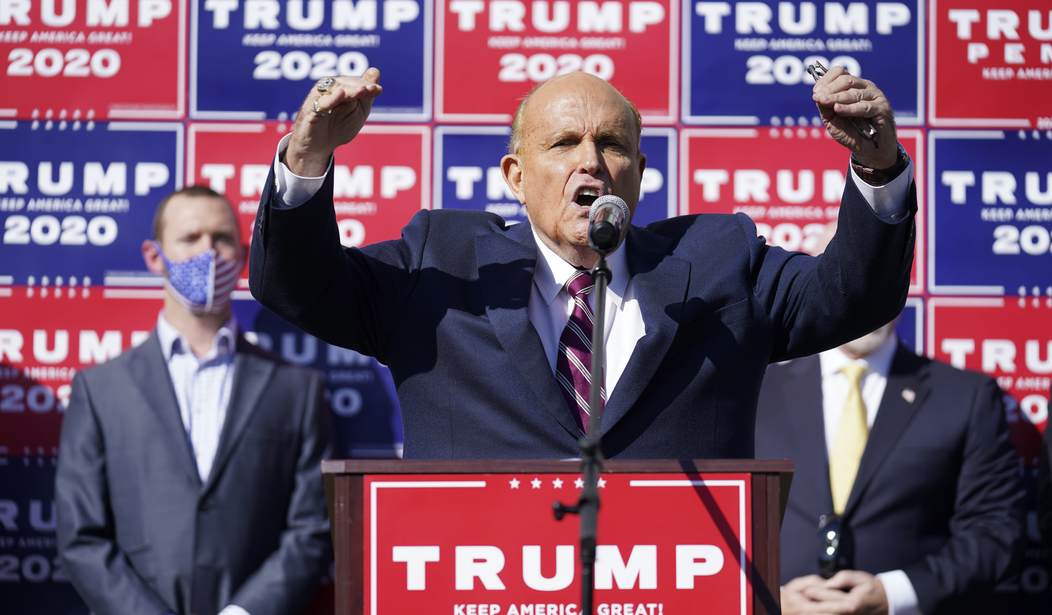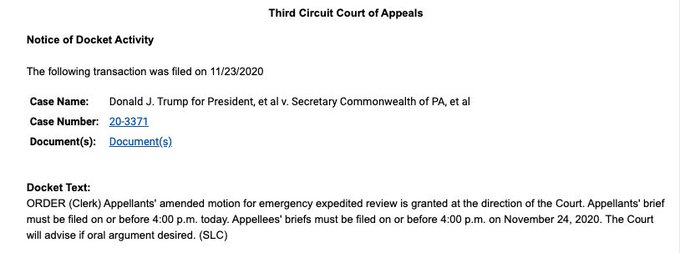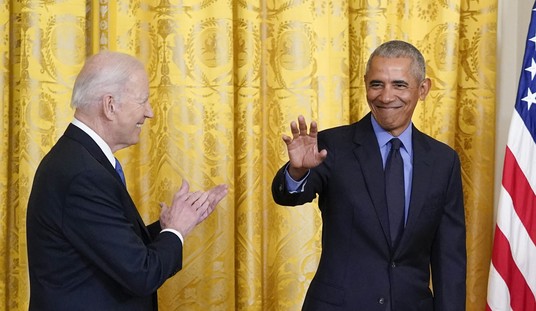On Monday the Court of Appeals for the Third Circuit granted the motion by the Trump Campaign for expedited review of its appeal of the District Court’s Order dismissing the complaint filed by the Campaign in the Middle District of Pennsylvania, and denying the motion of the Trump Campaign to file a Second Amended Complaint.
The district court dismissed the First Amended Complaint with prejudice on the basis that the Campaign lacked standing to pursue the equal protection claim stated in its First Amended Complaint, and denied the Campaign’s request to file a Second Amended Complaint in an effort to remedy the defects.
The only issue that is the subject of the appeal is the district court’s denial of the motion to file a Second Amended Complaint. This is a very narrow issue, and the case law is quite simple. Whether or not to allow a party leave to amend in order to file a Second Amended Complaint is a matter left to the sound discretion of the trial court, and the denial of leave to file a second amended is reviewed at the appellate level for “abuse of discretion.”
Generally, denying leave to amend is appropriate if efforts to amend the complaint would be futile, i.e., no set of allegations can be made which would constitute a cognizable legal claim that the Plaintiff has standing to advance. Because this is the standard, I expect that the Trump campaign is going to prevail in the Third Circuit because of some of the language used by Judge Brann in his memorandum setting forth the legal and factual reasons for his decision. He wrote the following:
The Trump Campaign has not offered another theory of standing, and therefore, cannot meet its burden of establishing Article III jurisdiction. To be clear, this Court is not holding that a political campaign can never establish standing to challenge the outcome of an election; rather, it merely finds that in this case, the Trump Campaign has not pled a cognizable theory.
In that passage Judge Brann acknowledged that it was not futile for the Trump campaign to seek to amend the complaint in order to establish standing, and to challenge the outcome of the election.
He sets for the correct standard for denying leave to amend — “Among the grounds that could justify a denial of leave to amend are undue delay, bad faith, dilatory motive, prejudice and futility” — but fails to explain why any of those grounds apply to the Trump Campaign’s motion for leave.
Instead he referenced the fact that the County Boards of Elections were required to certify their results on or before November 23, 2020, but does not explain why allowing the Trump Campaign to amend the complaint would prevent that from happening. The Campaign did file a motion for a preliminary injunction. But it would have been perfectly appropriate for Judge Brann to deny the motion and also allow the Amended Complaint at the same time.
As significantly, Judge Brann seemed to inappropriately consider the remedy — as well as mischaracterizing the remedy — that the Plaintiff was seeking by way of the action as a reason to deny leave to amend. He started out his memorandum with the following claim:
In this action, the Trump Campaign and the Individual Plaintiffs (collectively, the “Plaintiffs”) seek to discard millions of votes legally cast by Pennsylvanians from all corners – from Greene County to Pike County, and everywhere in between. In other words, Plaintiffs ask this Court to disenfranchise almost seven million voters.
In my view, the nature of a remedy sought by a litigation should play no role in the views of the presiding judge with regard to the theory advanced for seeking relief. In the event that the Plaintiffs prevail, the appropriateness of the remedy would be for the Court to determine at that time, based on the totality of the record before it. Judge Brann’s comments are logically no different than would be the case of dismissing a lawsuit over an auto accident because the Plaintiff asked for $10 trillion in damages. The Plaintiff can ask for whatever they want — whether the outcome of the case would warrant such relief is irrelevant to their entitlement to pursue their claim.
But even if the Third Circuit grants relief, and orders the District Court to allow a Second Amended Complaint to be filed, the cost to the Trump effort will be lost time. As I have said previously, the only way this matter gets to the Supreme Court is to lose — fast — in the lower courts. But the record created with the original Complaint and the terrible decision to file a First Amended Complaint which eliminated five of the seven original claims, left the state of the record in such terrible condition that the ability to carry the case forward through the appeals process was practically zero.
But the Pennsylvania Supreme Court has continued to pump out partisan decision after partisan decision over the past two weeks, and all of that increases the potential that the US Supreme Court may step in to look carefully at what the Pennsylvania Supreme Court has done. Getting this case in a better posture in terms of the facts as alleged in the complaint, and a coherent legal argument for why the losing candidate should be able to challenge decisions of state and county officials in their conduct of the election, are the only two purposes for going back to the district court with another amended complaint. But there is no time for another failure. The Campaign needs to get it right this time — even knowing that Judge Brann is going to dismiss the complaint yet again.
The Third Circuit is based in Philadelphia, but the Court could likely be friendly to claims made by the Trump Campaign. There are 14 active judges on the Court, with eight appointed by Republican Presidents and six appointed by Democrat Presidents. Pres. Trump was able to name four judges to the Circuit in just one term, the same number that Pres. Obama named to the Circuit in two terms. There are also four Bush appointees and two Clinton appointees.
The parties each have only 24 hours to file their respective briefs, and it is possible the Court will issue a decision as early as Wednesday.















Join the conversation as a VIP Member